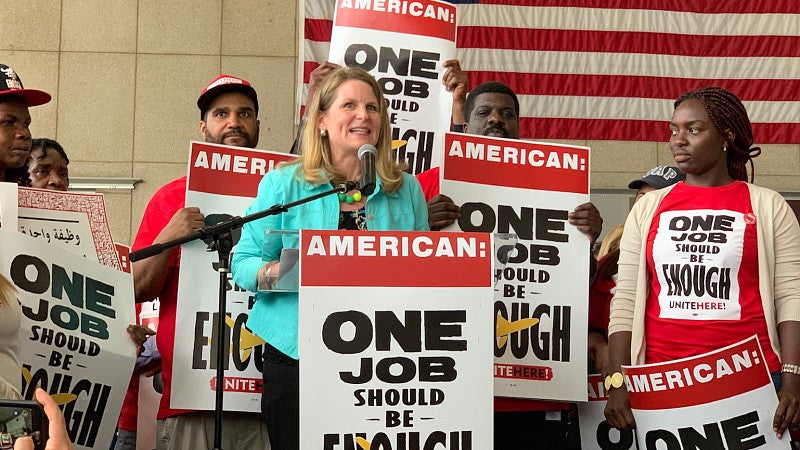
Liz Shuler of AFL-CIO is a Voice for the People
As the first woman and first Oregonian to helm the AFL-CIO, Liz Shuler leads the nation’s unions with conviction
By Kelsey Schagemann • Photo courtesy AFL-CIO • November 29, 2021
3 min readIn one sense, Liz Shuler’s journey to the AFL-CIO presidency began at the age of 11. Growing up in Gladstone, Oregon, Shuler and a friend babysat for neighborhood families—until they determined they weren’t being paid the same rate. That realization led to Shuler’s first collective bargaining experience, resulting in equal hourly wages for both sitters.
Shuler, BA ’92 (journalism), brings lifelong principles of fairness and equity to her role as president of the AFL-CIO. Elected in August, Shuler oversees the federation’s 57 national and international labor unions representing 12.5 million people.
“We use the power of our scale to advocate for a better life for all working people,” Shuler says. “We’re here to make sure people have good, high-quality jobs that can support a family, to help them through their careers, and to retire with dignity.”
On any given day, Shuler might talk policy with President Biden, strategize next steps in a strike, or meet with unions in the workplace. Her organization represents working people nationwide—firefighters, actors, bakers, flight attendants, nurses, postal workers, teachers, musicians, roofers, and so on. While different unions don’t agree on every issue or lean the same way politically, the AFL-CIO provides a point of connection and bargaining power on shared causes such as raising the minimum wage and health care.
Shuler got her start in the Electrical Workers (IBEW) Local 125 at Portland General Electric, the union of her father, a power lineman. On summer breaks and after college, Shuler was a clerical worker at the company; her mother also worked there, as an estimator. When the predominantly female clerical workers decided to organize in 1993, Shuler joined the campaign.
That campaign failed, but Shuler turned her disappointment into opportunity by joining the union’s staff. “I saw a path where I could advocate for more people to have a collective voice,” she says.
During five years with the local, Shuler wrote policy, built the website, led trainings, and served as the chief lobbyist and political operative. One of her proudest accomplishments was contributing to the defeat of Enron’s efforts to deregulate Oregon’s electricity market in 1999.
Soon after, Shuler moved to the political/legislative department of IBEW headquarters in Washington, DC, where she eventually became chief of staff to the IBEW president. In 2009, Shuler was elected AFL-CIO secretary-treasurer, becoming the youngest woman ever on the federation’s executive council.
Shuler is the first woman to become AFL-CIO president, and she recognizes the responsibility of being a role model for other women, mentoring the next generation of female union leaders, and honoring those who came before. “I think of all the women who sacrificed, who led on the picket lines and in their workplaces for so many years, not having access to leadership roles,” she says. “This has been a long time coming.”
Many of her own mentors were professors at the University of Oregon School of Journalism and Communication, including Professor Tim Gleason, who taught an ethics course that made a lasting impression.
Her UO education prepared her for her career, Shuler says, by helping her learn “to distill information and present it in a cogent way, probe and ask questions, and develop discipline.”
She remembers, with fear and fondness, a mandatory course called Information Gathering—known affectionately as “Info Hell”—that required the collection and summarization of 100 sources in support of an argument (Shuler argued for better mental health resources). “That was a class you couldn’t procrastinate in,” she says, “if you wanted to pass.”
Perhaps most of all, the UO experience solidified Shuler’s motivation to make a difference. “You come out of there so much more civic-minded,” she says. “It gave me a better appreciation for humanity.”
Kelsey Schagemann is a writer and editor in Chicago.



